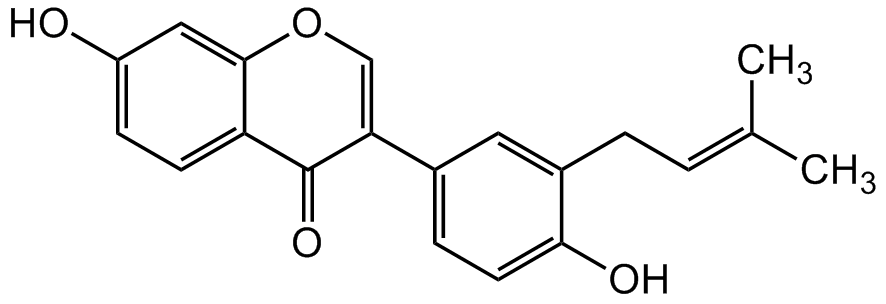
Chemical Structure
Neobavaisoflavone [41060-15-5]

AG-CN2-0498
Overview
- SupplierAdipoGen Life Sciences
- Product NameNeobavaisoflavone [41060-15-5]
- Delivery Days Customer10
- CAS Number41060-15-5
- CertificationResearch Use Only
- Estimated Purity>98%
- Molecular FormulaC20H18O4
- Molecular Weight322.4
- Scientific DescriptionAntibiotic. Antibacterial and antifungal compound. Displays antibiotic activity against Gram-negative multidrug resistant bacteria. Anticancer compound. DNA polymerase inhibitor. Enhances TRAIL-induced apoptosis via inhibition of metastasis. Anti-inflammatory agent inhibiting IL-6-induced STAT3 activation and phosphorylation. Platelet aggregation inhibitor. Human carboxylesterase 1&2 and UDP-glucuronosyltransferase 1A1 inhibitor, enzymes important in drug metabolism. Antioxidant. Inhibits the production of nitric oxide (NO), reactive oxygen species (ROS) and reactive nitrogen species (RNS). Neuroprotective. Exerts protective effects against H2O2-induced neuronal cell damage. Shows osteogenic acitivty. - Chemical. CAS: 41060-15-5. Formula: C20H18O4. MW: 322.4. Isolated from Psoralea corylifolia sp. Antibiotic. Antibacterial and antifungal compound. Displays antibiotic activity against Gram-negative multidrug resistant bacteria. Anticancer compound. DNA polymerase inhibitor. Enhances TRAIL-induced apoptosis via inhibition of metastasis. Anti-inflammatory agent inhibiting IL-6-induced STAT3 activation and phosphorylation. Platelet aggregation inhibitor. Human carboxylesterase 1&2 and UDP-glucuronosyltransferase 1A1 inhibitor, enzymes important in drug metabolism. Antioxidant. Inhibits the production of nitric oxide (NO), reactive oxygen species (ROS) and reactive nitrogen species (RNS). Neuroprotective. Exerts protective effects against H2O2-induced neuronal cell damage. Shows osteogenic acitivty.
- SMILESOC1=CC=C(C(C(C2=CC=C(O)C(C/C=C(C)/C)=C2)=CO3)=O)C3=C1
- Storage Instruction-20°C,2°C to 8°C
- UNSPSC12352200
References
- Prenylated isoflavanone from the roots of Erythrina sigmoidea: A.E. Nkengfack, et al.; Phytochemistry 36, 1047 (1994)
- Antiplatelet flavonoids from seeds of Psoralea corylifolia: W.J. Tsai, et al.; J. Nat. Prod. 59, 671 (1996)
- DNA polymerase and topoisomerase II inhibitors from Psoralea corylifolia: N.J. Sun, et al.; J. Nat. Prod. 61, 362 (1998)
- Studies on the chemical constituents of Psoralea corylifolia L.: B. Ruan, et al.; J. Asian Nat. Prod. Res. 9, 41 (2007)
- The combination of TRAIL and isoflavones enhances apoptosis in cancer cells: J. Bronikowska, et al.; Molecules 15, 2000 (2010)
- Inhibition of inflammatory mediators by neobavaisoflavone in activated RAW264.7 macrophages: E. Szliszka, et al.; Molecules 16, 3701 (2011)
- Neobavaisoflavone stimulates osteogenesis via p38-mediated up-regulation of transcription factors and osteoid genes expression in MC3T3-E1 cells: M.-J. Don, et al.; Phytomed. 19, 551, (2012)
- Phenolic compounds isolated from Psoralea corylifolia inhibit IL-6-induced STAT3 activation: S.W. Lee, et al.; Planta Med. 78, 903 (2012)
- Neobavaisoflavone sensitizes apoptosis via the inhibition of metastasis in TRAIL-resistant human glioma U373MG cells: Y.J. Kim, et al.; Life Sci. 95, 101 (2014)
- Activity of three cytotoxic isoflavonoids from Erythrina excelsa and Erythrina senegalensis (neobavaisoflavone, sigmoidin H and isoneorautenol) toward multi-factorial drug resistant cancer cells: V. Kuete, et al.; Phytomed. 21, 682 (2014)
